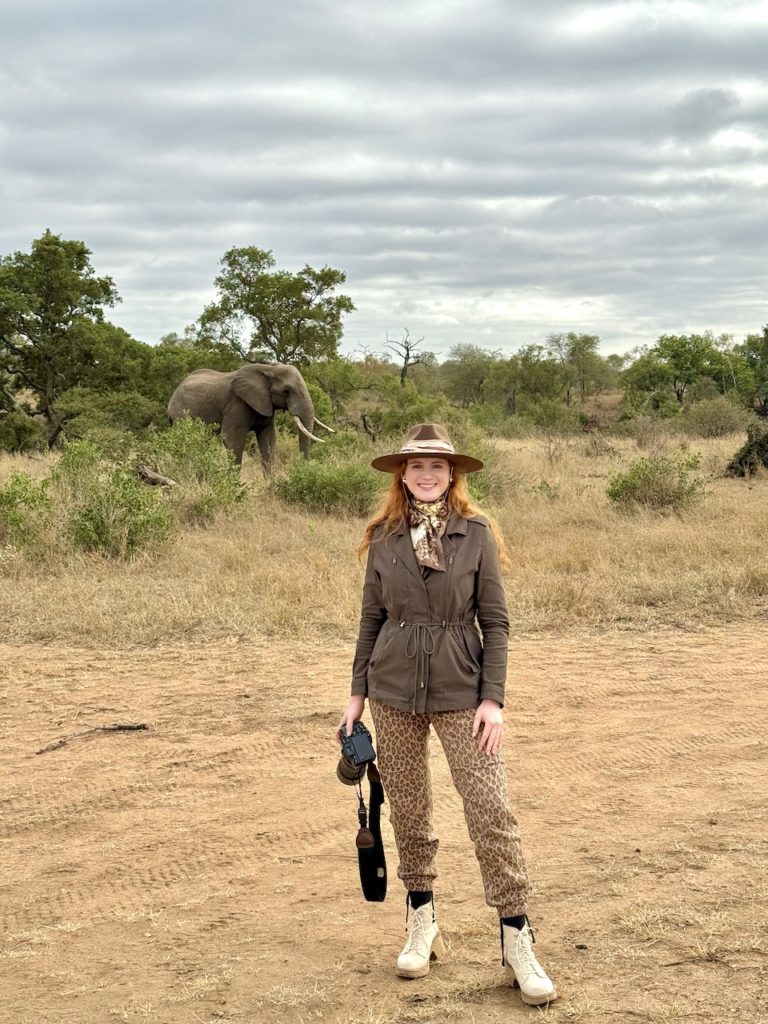
Josie in South Africa on her solo safari
You may think we have lost our minds, but we have sent our 20 something daughter to Africa by herself for a month! During her time there, she travelled across southern Africa South Africa, Zimbabwe, and Botswana to their cities, tourist spots, and wildlife camps.
As the interest for solo female travel throughout Africa rises, we want to share the tips and tricks we used to plan our daughter’s safari and the guidelines she used to stay safe and comfortable at every turn.
In this blog, we seek to answer your questions and tell you about the unique experiences, challenges, and triumphs that accompany solo female travel on an African safari. From navigating the vast savannas to immersing oneself in local cultures, join us as we explore the wonders and intricacies of embarking on this extraordinary journey alone as a woman.
Is it safe to travel to Africa as a woman alone?
Absolutely – solo female travel in Africa can be a safe, enriching, and unforgettable experience! The continent is home to numerous countries that are widely regarded as safe and welcoming to tourists, including solo female travelers.
We felt completely comfortable sending our daughter to Africa by herself and she was so excited to go! At no point did she feel unsafe during her time there.
Having said that, safety cannot be guaranteed ANYWHERE whether you are in one of the USA’s large cities, your own small town, or international destinations. BUT what we at Family Expeditions do is pair you with the most reputable tour operators for your safari, keep both you and ourselves informed about the area you are visiting, stay in constant contact with you throughout your journey, share with you any local customs and dress codes, and share the best information on how to keep yourself and belongings secure.
What are the safest countries and regions for solo female travelers in Africa?
- Botswana: Renowned for its stable democracy and eco-tourism, Botswana is a top choice for women traveling solo. It’s also celebrated for some of Africa’s best safari experiences in places like the Okavango Delta and Chobe National Park.
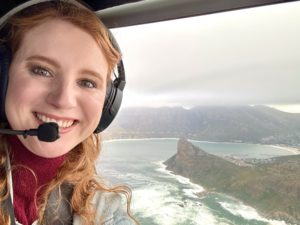
Our daughter absolutely loved her time in Botswana because of the kind and eager personalities of the people.
- Namibia: With its well-maintained roads, Namibia is perfect for solo travelers interested in road trips. Its stunning landscapes include the Namib Desert’s dunes and the shipwreck-strewn Skeleton Coast.
This is one of our favorite countries because it has one of the most stable governments in Africa. The people here are incredibly generous both with their patience and willingness to help.
- Rwanda: Despite its complex history, Rwanda is now considered one of Africa’s safest countries. It’s particularly famous for its gorilla trekking tours in Volcanoes National Park, and its capital, Kigali, is known for being clean, safe, and easy to navigate.
This country is known to be one of the most clean countries in Africa because of initiatives such as encouraging each family to assign one family member per weekend per month to spend a few hours picking up litter around their community.
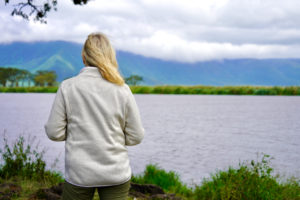 South Africa: While it’s crucial to be more careful in South Africa’s urban areas, this country can be a rewarding destination for female solo travelers. It offers the greatest diversity of experiences, from safaris in the Kruger National Park to the scenic beauty of the Garden Route, wine tasting and foodie adventures in the Cape Winelands, and the cosmopolitan allure of Cape Town.
South Africa: While it’s crucial to be more careful in South Africa’s urban areas, this country can be a rewarding destination for female solo travelers. It offers the greatest diversity of experiences, from safaris in the Kruger National Park to the scenic beauty of the Garden Route, wine tasting and foodie adventures in the Cape Winelands, and the cosmopolitan allure of Cape Town.
Throughout our daughter’s time in South Africa where she spent 10+ days in Cape Town and then visited Kruger, Durban, KZN, and the Winelands, she fell further in love with this country. The rich culture and vast array of adventures offer an incredible experience – especially when paired with our expert guides!
These are some of the best countries for a solo safari – but many countries in Africa are safe, viable options, as long as you have a knowledgeable agent (like Family Expeditions *wink* *wink*) on your side to help you plan your vacation.
Top tips for women on a solo safari:
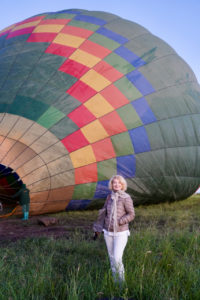 Stay in the know
Stay in the know
- Ensure you understand the cultural nuances of the countries you’re visiting. This could mean learning a few phrases in local languages and brushing up on gender roles in different societies.
- As with any state or other country around the world, African countries have specific regions that are safer than others. This is why it is so important to work with only the most reputable guides and lodges who will take you to safe areas and provide wisdom when picking your on-your-own activities.
- At Family Expeditions we help you with both of these points by providing you with both the important cultural information of the area and the areas which are safe to travel to. All of the guides we work with are also very selective in where they take our clients in order to best provide safety.
Getting around
- Opt for transportation recommended/offered by reputable travel guides/accommodations. In many African cities, registered taxis or ride-sharing apps are safer than public transportation or walking at night. Always share your travel route with someone you trust and avoid sharing personal details with drivers.
What to pack
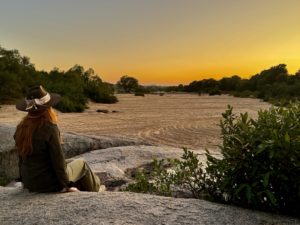 Include a lightweight scarf or sarong in your luggage. It’s an extremely versatile item, coming in handy for sun protection, modesty, or even as a makeshift towel.
Include a lightweight scarf or sarong in your luggage. It’s an extremely versatile item, coming in handy for sun protection, modesty, or even as a makeshift towel.- Beyond talking to your doctor about any recommended or necessary vaccinations, carry a travel medical kit, including prescriptions, and understand how to manage common ailments in the regions you’re visiting.
- Bring a reusable water bottle with a built-in filter. This reduces reliance on single-use plastics and always ensuring access to clean water. Many countries do have recommended safe tap water, but sometimes the chemicals used to treat it can cause some discomfort to those new to drinking it. Even in a safe drinking water area we recommend bottle or filtered water.
- Portable phone chargers. It seems inevitable that your phone dies when you need it most! We always pack a phone charger and cord with us as back up.
- At Family Expeditions we provide a detailed packing list based on our personal travel in the area and the recommendations of the guides/lodges we work with. We are here to answer all your packing questions and are even happy to send pictures of our outfits to help you visualize.
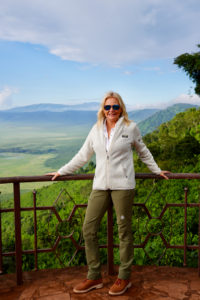 Safety
Safety
- Rest assured that your safety is top priority at all respected camps and lodges across Africa. That said, bringing a portable door lock or a door stopper along can provide greater peace of mind. Our daughter always had one and it just adds another layer of peace of mind.
- Keep physical and digital copies of important documents like your passport, visa, and insurance on a secure online storage platform. Our personal preference when we are travelling is to also have at least one copy of your important documents with us but in a separate place as the actual important documents. For example, if our passport is in our purse, we have copies in a different bag. This ensures that if one is lost, you have the other – and you never know when your phone will die!
- Download safety apps that allow you to share your location with trusted contacts or send SOS alerts. TripWhistle Global SOS is a good one, providing emergency phone numbers for police, medical, and fire services in over 200 countries, including many African nations. It also enables you to share your GPS location with friends or family.
- Invest in a travel insurance policy that covers activities you plan to do, such as safari drives, hiking, horseback safaris, or any adventure sports.We work with the top travel insurance companies and can assist you in selecting the best plan for you as well as purchasing it.
- While in the bush your guide will always remind you that any wildlife you are seeing is just that, wild. Keeping a respectful distance not only ensures your safety but also the well-being of the animals.Whether it be while walking down a city block or at a game reserve, you never know when a little wildlife will find its way to your area.
General tips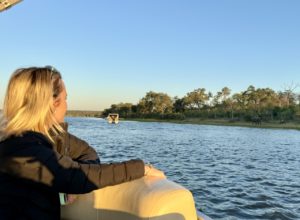
- Either purchase a local SIM card for more reliable, affordable coverage and to stay connected with friends and family back home OR talk to your cell phone provider about their coverage in the country(ies) you are visiting.
- While respecting local customs, choose clothing that blends in to avoid drawing unnecessary attention. We also always leave jewelry at home including anything fake that looks real – it’s great that you know its fake, but others do not! When on safari, brighter neutral colors are also better as they won’t startle wildlife or attract tsetse flies.
- Engaging with local women can be a highlight of your trip and offer unique insights into the community. Consider local cooking classes, craft workshops, or community tours which we can plan for you.
- While your focus should be on soaking up all the magic in the moment, you might also want to keep a travel journal to document and reflect on your experiences, thoughts, and learnings. During an amazing adventure many days can begin to blur, so having a journal helps you remember what you did each day.
- Leave room in your itinerary for relaxing and exploring something you have just discovered. Some of the best experiences come from deciding to try something new on the fly!
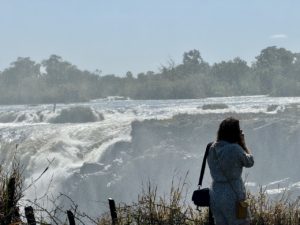 What will I gain by going on a solo safari?
What will I gain by going on a solo safari?
- Feeling empowered.
- New friends.
- Confidence in who you are.
- A fresh sense of adventure.
- A Refreshed and thankful spirit.
- And so much more!
At Family Expeditions we love Africa so much that it’s become a complete addiction! We have worked in Africa for over 30 years travelling as a family, with friends, on ladies-only trips, and solo. We know the best places to visit and pair you with the guides who know there way around every area they work in.
We feel completely confident in sending you to this incredible continent which will have you addicted as we are!
*ring* *ring* Africa is calling – will you pick up?!






